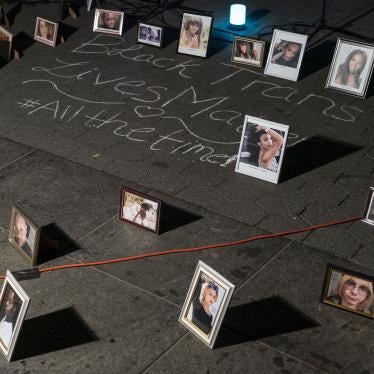Human Rights Watch urges the Defense Department to implement rapidly the "Don't Ask, Don't Tell Repeal Act of 2010." As documented in our 2003 report, "Uniform Discrimination: the ‘Don't Ask, Don't Tell' Policy of the US Military," men and women who have served their country with courage, skill, and distinction have been discharged from the US military simply because of their sexual orientation. Since the policy was enacted in 1993, 14,000 service members have been wrongfully discharged. President Obama's repeal of the discriminatory legislation was a major step forward in affording equal rights to lesbian, gay, and bisexual people and corrects a serious injustice inflicted upon men and women by the country for which they were willing to sacrifice their lives.
Background
The U.S. prohibited homosexuals from serving in the military for most of the twentieth century. In 1993, Congress passed new legislation replacing that prohibition with the "don't ask, don't tell" policy, a compromise between those, led by President Bill Clinton, who believed the prohibition was discriminatory and wrong, and those, including military leaders, determined to maintain the prohibition. Under the “don’t ask, don’t tell” policy, gay men, lesbians, and bisexuals would be able to serve as long as they kept their sexual orientation a secret and did not engage in homosexual conduct, including off base. In return for agreeing to remain silent and celibate, gay men, lesbians, and bisexuals were to be protected against unwarranted intrusions into their private lives. Private consensual sex by a servicemember with someone of the same sex remained a criminal offence under military law.
Although the "don't ask, don't tell" policy was intended to allow gay, lesbian, or bisexual servicemembers to remain in the military, discharges have steadily increased since the policy's adoption. According to the Servicemembers Legal Defense Network (SLDN), from 1994 through the end of 2001, more than 7,800 men and women were discharged from the military because of their actual or perceived homosexuality. In 2001 alone, a record 1,256 were discharged, a figure nearly double the homosexual separation rate of 730 in 1992, prior to "don't ask, don't tell." Since the policy’s adoption in 1993, SLDN reported in 2010 that 14,000 servicemembers have been discharged. These thousands of servicemembers were not separated from the military because of a lack of skill, courage, commitment, or ability to work with fellow servicemembers. They were required to leave the armed forces because of a policy that reflects the bias of a heterosexual majority against a homosexual minority.
The "don't ask" dimension of the policy was supposed to benefit homosexuals by ending unwarranted official efforts to uncover their sexual orientation. Yet servicemembers continued to report hundreds of instances each year in which the letter and the spirit of the policy were violated. Even in the absence of "statements" of homosexuality or of credible evidence of homosexual conduct, officials have inappropriately delved into the sexual orientation of men and women, eventually prompting their discharge. Gay and lesbian servicemembers believe violations of the "don't ask" component of the policy are committed with impunity.
By establishing special rules for gays and lesbians that do not apply to heterosexuals, the "don't ask, don't tell" policy codified anti-homosexual discrimination. By stigmatizing homosexuality, the policy also perpetuated prejudice against and invited harassment of gay servicemembers. In theory, all servicemembers are to be treated with dignity and respect regardless of sexual orientation. In practice, gay servicemembers endure anti-gay remarks, name-calling, threats, and even physical attacks. In the case of Private First Class Barry Winchell, homophobia led to murder: a fellow soldier wielding a baseball bat beat Winchell to death in 1999. Female servicemembers are subjected to an additional form of harassment-"lesbian-baiting"-whereby male servicemembers label as lesbians women who rebuff their sexual advances or who do not act "feminine" enough, a label that threatened their careers.
Not only is there no evidence that the "don't ask, don't tell" policy is required to further the military's mission, there is considerable reason to believe it is counter-productive. As noted above, the policy has resulted in the loss of thousands of capable, experienced personnel. At a time when U.S. forces are engaged in armed conflict and multiple peacekeeping missions, the average discharge of more than three servicemembers a day, many with exemplary records, simply for failing to keep secret that they are homosexual or bisexual, or for engaging in private, consensual sexual conduct, appears antithetical to military objectives. The policy was also expensive. The military had to spend an estimated $218 million to recruit and train replacements for those removed as homosexuals. But the real cost of the policy was to be measured in the misery it created in the lives of so many men and women whose wish was to serve their country.





